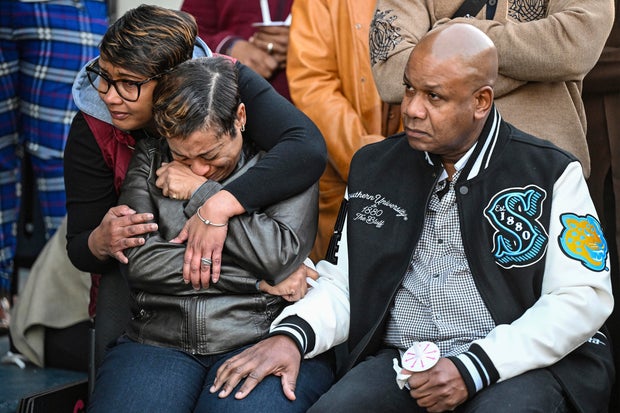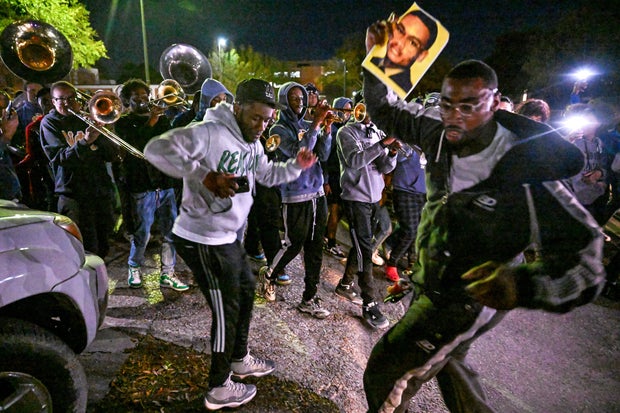A 20-year-old Southern University student died after an alleged off-campus fraternity hazing ritual in Baton Rouge, Louisiana, in late February.
The student, Caleb Wilson, “died as the direct result of a hazing incident where he was punched in the chest multiple times while pledging to Omega Psi Phi fraternity,” Baton Rouge Police Department Chief Thomas Morse Jr. said at a news conference on March 7.
One person has been charged in Wilson’s death so far and more arrests were expected, Morse said.
Here’s what we know about Wilson’s death.
Arrest in Caleb Wilson’s alleged hazing death
Caleb McCray, 23, has been charged with criminal hazing and manslaughter in Wilson’s death. McCray turned himself in on March 6 and was booked into East Baton Rouge Parish Prison, Morse said. He was later released on bond, CBS affiliate WAFB reported.
McCray is a current member of the Omega Psi Phi fraternity, according to an arrest warrant affidavit reviewed by CBS News. He is a graduate of Southern University, WAFB reported.
In a statement, an attorney for McCray acknowledged the charges and said McCray “should be afforded the opportunity to establish his innocence in the court of law.”
Javier Gallegos / AP
What was the alleged hazing ritual?
Wilson and eight other Omega Psi Phi fraternity pledges went to a warehouse of a flooring company in Baton Rouge on Feb. 26 for a meeting, according to the arrest warrant. At the warehouse, they changed into gray sweatsuits.
The pledges were lined up and each punched four times by at least three people wearing boxing gloves, the warrant said. McCray allegedly punched Wilson four times in the chest, according to witnesses cited in the warrant.
When Wilson was punched, he appeared to have a seizure and fell to the ground, the warrant said. The other pledges were moved to a separate room while some fraternity members attended to Wilson, the warrant continued.
No one called or attempted to call 911 or tried to summon an ambulance, Morse said.
Wilson was later dropped off by a group of males at Baton Rouge General Medical Center, Morse said. The time between his collapse and arrival at the hospital was not immediately clear.
The individuals who took him to the hospital told staff there that Wilson collapsed while playing basketball at a park, Morse said. That was later determined to not be accurate, he said.
Wilson was pronounced dead by medical personnel at the hospital and police were notified of his death. An autopsy identified a “small bruise” on the right side of Wilson’s chest, the warrant said, but further information about his cause and manner of death was not released.
In a search of the warehouse, a pair of black boxing gloves were recovered, according to the warrant.
No evidence indicates McCray intended to cause death or great bodily harm to the pledges, the warrant concluded.
Omega Psi Phi chapter ordered to cease all activities
Southern University, a historically Black university, has launched an internal investigation into the incident and ordered the Omega Psi Phi chapter to cease all activities, the school said.
Additionally, the university has banned all Greek organizations on campus from taking in any new members at least through the remainder of the academic year, Dennis Shields, president of the Southern University System, said at the March 7 news conference.
Students found to be involved in Wilson’s death could face expulsion, Shields said.
Who was Caleb Wilson?
Wilson, 20, was a junior at Southern University majoring in mechanical engineering. He was from Kenner, Louisiana, WAFB reported.
Wilson was a member of Southern University’s marching band, the Human Jukebox.
“A talented trumpet player, a dedicated student, and a bright soul, Caleb was a mechanical engineering major who poured his passion into both his studies and his time with the Human Jukebox,” a post on the band’s Facebook page says. “His energy, spirit, and impact on those around him will never be forgotten.”
Javier Gallegos/The Advocate via AP
Wilson’s family said in a statement that he was “a bright and talented young man with a promising future ahead of him,” according to WAFB.
A funeral service is set to be held on March 15, WAFB reported.
What is hazing?
Hazing is generally defined as an activity or action as a condition of joining or participating in a group that endangers, embarrasses or degrades a person.
Hazing can occur in multiple settings, including college fraternities and sororities, school clubs or sports teams, the military and workplaces.
Southern University’s Greek Life Code of Conduct defines hazing as “any action taken or situation created, intentionally, whether on or off campus, to produce mental or physical discomfort, embarrassment, harassment, or ridicule.”
Examples in the code of conduct include marching in line, forced or extreme physical activity, forced or involuntary spending, standing for a length of time, personal servitude, sleep deprivation or interruption of consecutive sleep hours, acts of humiliation or degradation, interruption or interference of academic commitments and paddling in any form.
“All organizations on campus are required to undergo rigorous anti-hazing training,” Southern University said in a statement.
Anti-hazing laws in Louisiana
Louisiana is one of 44 states that have anti-hazing laws, according to StopHazing, an organization that promotes hazing prevention.
Hazing can be a felony in the state under the Max Grover Act. The law passed in 2018 and was named after a Louisiana State University student who died of alcohol poisoning after being hazed at a Phi Delta Theta fraternity house.
The state law defines hazing as “any intentional, knowing, or reckless act by a person acting alone or acting with others that is directed against another when both of the following apply:
(i) The person knew or should have known that the act endangers the physical health or safety of the other person or causes severe emotional distress.
(ii) The act was associated with pledging, being initiated into, affiliating with, participating in, holding office in, or maintaining membership in any organization.”
According to the law, if the hazing results in a serious bodily injury or death, violators can be fined up to $10,000 and face up to five years in prison.
contributed to this report.




